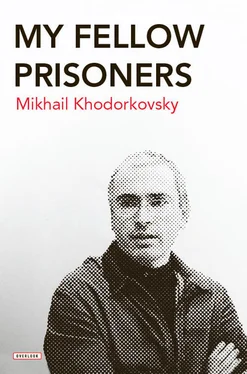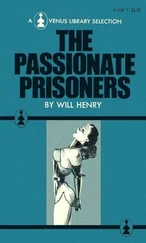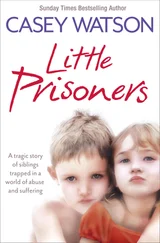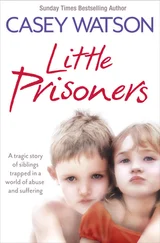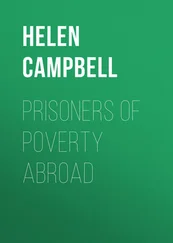I got to know a guy who was doing time for a paedophilia-related crime and who was consistently refused all requests for parole and a reduced sentence.
Alexei had ended up in prison at the age of nineteen. He’s now twenty-two – a nice young guy who doesn’t have any tattoos or other ‘peculiarities’ that often characterize prisoners. He’s hard-working and does amazing things on the old metal-turning lathe.
His story is simple. As a teenager he was given a suspended sentence for robbery. It was pretty run-of-the-mill – he had one too many, nicked a mobile phone from an acquaintance, an hour later found himself in custody. He got four years suspended.
To this day he gets very embarrassed when I call him a ‘bandit’ and ask him to explain why he did it.
He’s clearly ashamed about the whole thing, and doesn’t even want to talk about it.
Two years went by; he was still going to school. Aged eighteen he met a girl, Ira, at a disco. She was underage. They started living together, at her parents’ home. They hoped to get married as soon as they could. But then the campaign against paedophilia started. The town they lived in wasn’t big, everyone knew everything that went on. The local police officer received his ‘quota’ demand, and so he went into action. The parents of the girl wrote letters, the bride-to-be sobbed in the courtroom, but it was all to no avail. The judge ‘understood everything’ but she too had a quota to fill and a campaign to adhere to.
The result: five years, taking into account the suspended sentence.
It was the minimum sentence the judge could impose, if you ignore the fact that the verdict was completely unfair in the first place.
For two years Ira waited for Alexei. They hoped that the court would reconsider his case, that he would be released on parole. But, alas, it became clear that none of these bureaucrats was prepared to go against the grain.
Even visits were impossible.
After two years Alexei wrote to Ira telling her not to wait for him. And he stopped replying to her letters.
I look into his eyes. No, there are no tears, just a well-hidden, deep-rooted despair.
He’s a strong, good-natured guy, like so many other strong, uncomplicated people. They took away not just his freedom but also his happiness. He doesn’t complain, he accepts those who are his seniors, his ‘bosses’, as a force of nature. He was caught up by a wave and thrown on to the shore – alone, without a home, without a family.
What can you do?
But I am left feeling angry and bitter about this hopelessness, about the cruelty of our system, about the cries of people who don’t want to know the truth and demand only one thing: ‘Crucify him!’
Everyone needs to stop; look around you! Not everything is that simple and unambiguous.
During my time in prison I’ve met a good number of such unfortunate people. Some of them have their partners waiting for them. They have a long wait. Some get married in prison. Children come along. And the fathers are still there behind bars, condemned as ‘paedophiles’.
What sort of people are we, if we allow such a thing?
‘The investigation will get things straight’
When I read articles, letters or blogs I am often amazed at people’s genuine belief in the integrity of the police and judiciary, and how their pronouncements and interviews are taken as a fairly reliable source of information.
I will admit, of course, that many representatives of these professions, in their personal lives, are entirely decent citizens who, like the rest of us, lie only occasionally – when they have to – and feel bad about doing so.
When they’re at work and part of ‘the system’, however, they lie virtually all the time, and as a rule tell the truth only to gain someone’s trust – which then enables them to lie more successfully afterwards. They lie to individuals, to the court, to one another. These are the rules of a system which, if for this reason alone, needs to be dismantled. It just isn’t a place where honest people can function.
I happened to come across a rather interesting person in prison. A con-man, a member of one of the ‘law enforcement’ gangs. Led by a colonel serving as prosecutor, the gang comprised dozens of operatives, a customs officer, a few other people of official rank, a civilian intermediary (my new acquaintance) and a trader.
Its ‘business’ was of the standard kind: the customs officer would find out who had just received some merchandise at the warehouse, the prosecutor (as he then was) would initiate criminal proceedings, the operatives would ‘arrest’ the goods and pass them on to the trader who sold them at profit, whereas a notional cost was returned as ‘compensation for the loss’.
While all this was going on, the owners of the property would be rotting away in jail; afterwards they would either be released or given the full treatment, depending on how ‘perceptive’ they’d proved to be.
And so it continued until one fine day when this particular cabal happened to stumble across a bigger racket than their own.
While the prosecutor slunk off to Armenia, and the operatives were released on bail, the civilian members of the group ended up in pre-trial detention. It’s well known, after all, that ‘ravens don’t peck out other ravens’ eyes’.
Despite what had happened, my cellmate still retained a steadfast faith in the ‘law-enforcement agencies’. ‘The investigation will get things straight’ was his stock response to any flagrant abuse we might hear about from fellow inmates, or see on television.
At first this really got on everyone’s nerves. In prison there just isn’t anyone so naïve as to put their trust in ‘the investigation’. But then I found a useful outlet for my cellmate’s way of thinking. For example, when we watch a TV report on a police general’s luxury residence worth millions of dollars – gilded toilets, piles of jewellery, the works – I immediately ask: ‘How come nobody knew? He must have been paying off the top brass, surely? What’s the investigation going to say?’
‘The investigation will get things straight,’ is my cellmate’s inevitable response. ‘No doubt the money for the house was provided by the general’s children who earned it honestly working in a state company; criminal elements who’d had their wings clipped by the general must have set him up, and the most he’s guilty of is dereliction of duty.’
When I first heard this kind of reasoning, I assumed my cellmate was joking. But he was quite serious, and a couple of weeks later his version was confirmed by the official press secretary of the ‘respected’ Investigative Committee.
And so it went on. Whether it was the latest government bandit shown on TV or an article about a truly dreadful case like a drunk copper running over a woman and her child, my cellmate would declare that ‘the investigation will get things straight’; and he’d come up with some totally absurd version of events (along the lines of ‘they threw themselves under the wheels, and in any case he’d been dismissed from the force long before’). And soon enough this version would be officially confirmed. He got it right every single time.
But nothing lasts for ever. The time came for his verdict. None of us were surprised when the operatives got suspended sentences, the trader ten years, and my cellmate – fourteen.
The investigation had straightened things out all right…
But to say that to his face would have been cruel. Back in the cell, not a word was spoken…
After a couple of days the shock wore off and he sat down to lodge a cassation appeal, saying: ‘It’s okay, the investigation will get things straight.’
Читать дальше
